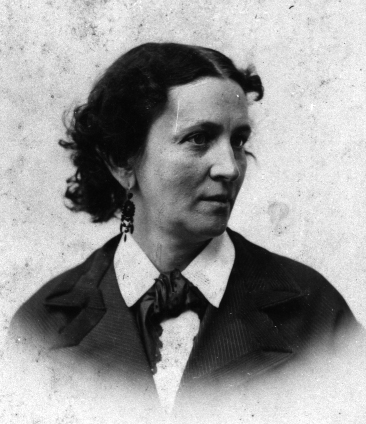13 May 1827–30 Mar. 1886

Mary Bayard Devereux Clarke, author and editor, was born in Raleigh, the daughter of Thomas Pollock and Catherine Anne Johnson Devereux. Her illustrious ancestors included the New England divines Jonathan Edwards and Samuel Johnson. The Pollocks (Polloks) were prominent in North Carolina history; the first came to Carolina from Scotland as a deputy of the Lords Proprietors Carteret and Beaufort, serving as their agent for fifty years. On the death of Governor Edward Hyde, Thomas Pollock, as president of the colonial council, was governor until the arrival of Charles Eden, Hyde's successor. When Eden died in 1722, Pollock again served as governor. The extensive land tracts he acquired remained in the family as plantations on the Roanoke, Chowan, and Trent rivers.
In a background of inherited wealth and emphasis on education, Mary Bayard's parents provided English governesses to superintend the education of their daughters. The only son, John, attended Yale, and the training of the daughters was described as equivalent to his course of instruction at the university. Mary Bayard inherited a family tendency toward consumption and lived for some time in the West Indies and later in Texas. Following her marriage to William J. Clarke, a native of New Bern and a Mexican War veteran, she lived on a sugar plantation in Louisiana. Just before the Civil War, the Clarkes returned to North Carolina and lived in New Bern and Raleigh.
Mrs. Clarke's first writing was recreative, succeeded by years of career writing to supplement her husband's dwindling income. Patriotic verses appearing in newspapers became household words in many southern hearts. These and other writings were published in Mosses from a Rolling Stone, or Idle Moments of a Busy Woman , sold for the benefit of the Stonewall Cemetery in Winchester, Va. In 1865 she edited Southern Field and Fireside , advertised as "entirely devoted to Polite Literature, [a] gem for the fireside, an ornament for the parlor, and an indispensable companion to the housewife and agriculturist." She wrote book reviews for the publishers Harper, Appleton, and Scribner and composed hymns (at five dollars apiece), an operatic libretto titled Miskodeed , and an opera intended for publication. Her translation of Victor Hugo's poems, republished in England, "attracted attention by the beauty and rhythm into which they are so truthfully rendered," and drew comment in France as "particularly happy." She contributed to the Old Guard (New York) and Demorest's Monthly , wrote novelettes published in Peterson's Magazine , and produced reminiscences of prominent North Carolinians for The Land We Love . She edited the Literary Pastime , a weekly journal published in Richmond. She was also recognized for collecting and preserving the writing of other North Carolina women. A most unusual contribution appeared in the records of the Supreme Court of North Carolina: in July 1868, Edmund Freeman, "venerable and beloved" clerk of the court, died at the stroke of noon on the day, hour, and minute when the term of the justices expired; Mrs. Clarke's poem commemorating the event was read by Daniel G. Fowle (later governor of the state), and on his motion the justices ordered it "spread upon and made a part of the minutes of the court."
Critics of Mrs. Clarke's work declared it romantic and imitative, although its references to North Carolina evidenced a "wholesome clarity of outlook." Her prose and poetry, according to other critics, were characterized by "simplicity, power and naturalness"; "her poetry in the parlor was what Daniel Webster's speeches were in the Senate." Editor William Seaton of the National Intelligencer predicted that she would make a name for herself among the nation's poets; she might not live "to see the noontide of her success but I already discern its dawn." The Land We Love received favorable criticism for an ability to present poetic beauty in the common things of everyday life with remarkable strength and richness of imagery. The Southern Literary Messenger described her as an elegant prose writer.
The Clarkes had two sons and a daughter. The eldest son, Francis Devereux, became a nationally recognized educator of the deaf.
Failing health in later years and periods of despondency led Mrs. Clarke to a temporary attachment to the Roman Catholic church and the Ethical Culture Society, but she ended life as a "faithful Protestant." She had a fatal stroke in 1886. The Raleigh News and Observer commented on the loss as that of "one of its most gifted daughters, whose facile pen wrought melodious verse, and whose writing attracted deserved attention and admiration. She was a devoted daughter of the state and did more than any other woman to collect and preserve the literary work of others of her sex, who were its natives." She was buried in Cedar Grove Cemetery, New Bern.